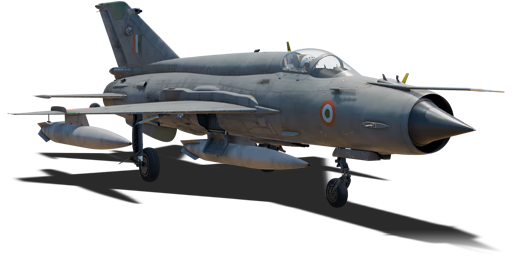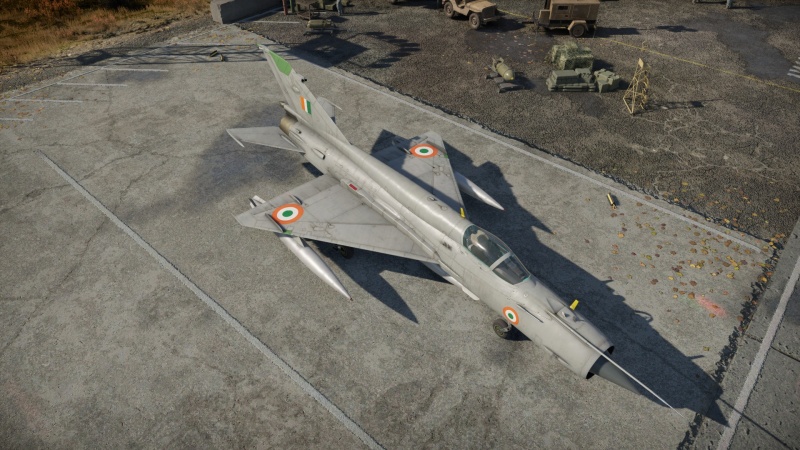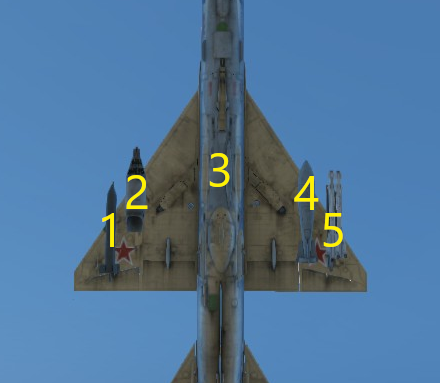Difference between revisions of "MiG-21 Bison (Great Britain)"
U106103246 (talk | contribs) (→Usage in battles) (Tag: Visual edit) |
U137389888 (talk | contribs) (Tag: Visual edit) |
||
| Line 230: | Line 230: | ||
* Pulse-Doppler radar | * Pulse-Doppler radar | ||
* Good manoeuvrability | * Good manoeuvrability | ||
| + | * Excellent acceleration in level flight and in a dive | ||
* Small airframe | * Small airframe | ||
Latest revision as of 00:31, 27 July 2024
| This page is about the Indian jet fighter MiG-21 Bison (Great Britain). For other versions, see MiG-21 (Family). |
Contents
Description
During the 1990s, India decided to undergo an upgrade program for their fleet of MiG-21bis aircraft, based on the newly unveiled MiG-21-93 modernization package. After a lot of negotiation and prototyping, it was decided that with Mikoyan OKB's help, HAL (Hindustan Aeronautics) would produce the "kits" to upgrade the aircraft. The MiG-21Bis-UPG aircraft, affectionately named the "MiG-21 Bison" was a specially tailored upgrade package that left out some of the original upgrades of the 21-93, but also incorporated some indigenous avionics and systems that the original did not. One such system was the TARANG radar warning receiver and jammer suite. The Bisons were slated to remain in indian service as rear-line interceptors until at least 2025, however, due to political reasons, this was cut short and all MiG-21s in the IAF's fleet were retired in 2024.
The ▄MiG-21 Bison was introduced in Update "Seek & Destroy". As a premium aircraft, it provides a great alternative to the F-4J UK for researching the higher ranks of the tech tree. The MiG-21 Bison is a heavily upgraded MiG-21bis airframe, and at its battle rating, the extremities of such upgrade begin to show. While the aircraft has incredible weaponry and avionics for its battle rating, the missile count and overall flight performance begins to show its limits when facing superior aircraft in uptiers such as F-15s, Su-27s, and JAS-39s. The Bison is also one of the very few aircraft in-game fitted with a GTM (Air to Ground) tracking mode in its radar, allowing it to lock on to ground vehicles and maritime targets, and track their movement from far away. This, coupled with targeting of the KAB-500Kr TV guided bombs, allows the Bison to execute quick and precise interdiction strikes. Just be careful of the low amount of ordnance and countermeasures on this aircraft.
General info
Flight performance
Describe how the aircraft behaves in the air. Speed, manoeuvrability, acceleration and allowable loads - these are the most important characteristics of the vehicle.
| Characteristics | Max speed (km/h at 13,000 m) |
Max altitude (metres) |
Turn time (seconds) |
Rate of climb (metres/second) |
Take-off run (metres) | |||
|---|---|---|---|---|---|---|---|---|
| AB | RB | AB | RB | AB | RB | |||
| Stock | ___ | ___ | __._ | __._ | __._ | __._ | 750 | |
| Upgraded | 2,303 | 2,240 | 35.6 | 37.0 | 262.0 | 225.0 | ||
Details
| Features | |||||
|---|---|---|---|---|---|
| Combat flaps | Take-off flaps | Landing flaps | Air brakes | Arrestor gear | Drogue chute |
| X | ✓ | ✓ | ✓ | X | ✓ |
| Limits | ||||||
|---|---|---|---|---|---|---|
| Wings (km/h) | Gear (km/h) | Flaps (km/h) | Max Static G | |||
| Combat | Take-off | Landing | + | - | ||
| ___ | ___ | ___ | ~__ | ~__ | ||
| Optimal velocities (km/h) | |||
|---|---|---|---|
| Ailerons | Rudder | Elevators | Radiator |
| < ___ | < ___ | < ___ | - |
Engine performance
| Engine | Aircraft mass | |||||
|---|---|---|---|---|---|---|
| Engine name | Number | Basic mass | Wing loading (full fuel) | |||
| Tumansky R-25-300 | 1 | _,___ kg | ___ kg/m2 | |||
| Engine characteristics | Mass with fuel (no weapons load) | Max Gross Weight | ||||
| Weight (each) | Type | _m fuel | __m fuel | __m fuel | ||
| 1,140 kg | Afterburning axial-flow turbojet | _,___ kg | _,___ kg | _,___ kg | _,___ kg | |
| Maximum engine thrust @ 0 m (RB/SB) | Thrust to weight ratio @ 0 m (___%/WEP) | |||||
| Condition | 100% | ___%/WEP | _m fuel | __m fuel | __m fuel | MGW |
| Stationary | ___ kgf | ___ kgf | _.__ | _.__ | _.__ | _.__ |
| Optimal | ___ kgf (_ km/h) |
___ kgf (_ km/h) |
_.__ | _.__ | _.__ | _.__ |
Survivability and armour
Examine the survivability of the aircraft. Note how vulnerable the structure is and how secure the pilot is, whether the fuel tanks are armoured, etc. Describe the armour, if there is any, and also mention the vulnerability of other critical aircraft systems.
Modifications and economy
Armaments
| Ballistic Computer | ||||
|---|---|---|---|---|
| CCIP (Guns) | CCIP (Rockets) | CCIP (Bombs) | CCRP (Bombs) | EEGS |
| |
|
|
|
|
Offensive armament
The MiG-21 Bison (Great Britain) is armed with:
- 1 x 23 mm GSh-23L cannon, belly-mounted (200 rpg)
- 60 x large calibre countermeasures
Suspended armament
The MiG-21 Bison (Great Britain) can be outfitted with the following ordnance:
| 1 | 2 | 3 | 4 | 5 | ||
|---|---|---|---|---|---|---|
| 100 kg OFAB-100 bombs | 4 | 4 | ||||
| 250 kg FAB-250M-62 bombs | 1 | 1 | 1 | 1 | ||
| 500 kg FAB-500M-62 bombs | 1 | 1 | ||||
| 500 kg KAB-500Kr bombs | 1 | 1 | ||||
| 500 lb LDGP Mk 82 bombs | 1 | 1 | 1 | 1 | ||
| 1,000 lb LDGP Mk 83 bombs | 1 | 1 | ||||
| ZB-500 incendiary bombs | 1 | 1 | ||||
| S-5K rockets | 16 | 16, 32 | 16, 32 | 16 | ||
| S-8KO rockets | 20 | 20 | ||||
| S-24 rockets | 1 | 1 | 1 | 1 | ||
| R-27R1 missiles | 1 | 1 | ||||
| R-27T1 missiles | 1 | 1 | ||||
| R-73E missiles | 1 | 1 | ||||
| 490 l drop tanks | 1 | 1 | 1 |
| Default weapon presets | |
|---|---|
| |
Usage in battles
The best way to use the Bison is to fly at medium to low altitude and use map terrain as cover from BVR missiles, notching and deploying chaff when necessary. The outstanding thrust vectoring R-73s are your main weapon of choice with this vehicle, go for bombers or unaware fast targets above you, there is plenty of large countermeasures to ensure your survival when getting into a firing position. Take advantage of the helmet aiming to get tough angle locks, leading your missile to fire ahead of the enemy. The only real limit of the R-73 is you only get a single pair of them. Your backup offensive weapons are the R-27 (radar or IR): the radar variant makes for interesting playstyles and the aircraft is equipped with a serviceable radar but isn't reliable at any large range, the IR version is no R-73 by any means but it does have a longer range, larger warhead, and boasts impressive characteristics nonetheless. Save these larger missiles for less manoeuvrable targets such as bombers and attackers. Finally, be sure to constantly scan your RWR and radar systems to get a view of the battlefield and potential targets and risks.
Do keep in mind that this is a 1950s airframe flying against 1990s modern jets. Speed, sensors, and payload are not the strong suits of this aircraft, use your turn radius, airbrakes, and strategy to outmatch any difficult enemies, the missiles at your disposal will do most of the work if you can get a launch. This aircraft has very limited ground ordnance and is better off as an air superiority fighter, however, if one wishes to use this plane in the CAS role, there is a few options such as the Soviet KAB-500Kr (500 kg) TV guided bomb and a number of Soviet and NATO unguided bombs and rockets. Fly low and fast and deploy countermeasures during and after each attack run. Of note, at its BR the 23 mm cannon is an afterthought with very limited ammo, only use it to finish off enemies or against slow targets, missiles are the main armament at this range.
Pros and cons
Pros:
- Very capable R-73E and R-27 missiles which can be used with a Helmet-Mounted Sight
- Improved RWR which allows for greater combat awareness
- Pulse-Doppler radar
- Good manoeuvrability
- Excellent acceleration in level flight and in a dive
- Small airframe
Cons:
- Only 4 missiles
- Weak energy retention
- MiG-21bis airframe which may be lacking at the BR
- GSh-23L has very bad velocity making it difficult to aim
- Limited arsenal for ground attacking
History
Describe the history of the creation and combat usage of the aircraft in more detail than in the introduction. If the historical reference turns out to be too long, take it to a separate article, taking a link to the article about the vehicle and adding a block "/History" (example: https://wiki.warthunder.com/(Vehicle-name)/History) and add a link to it here using the main template. Be sure to reference text and sources by using <ref></ref>, as well as adding them at the end of the article with <references />. This section may also include the vehicle's dev blog entry (if applicable) and the in-game encyclopedia description (under === In-game description ===, also if applicable).
Devblog
In the early 1990s, Mikoyan and its partner companies launched an upgrade and modernization package for the MiG-21Bis with the aim of offering it to the many operators of the type over the world. Their aim was to prolong the service life of the aircraft against rapidly advancing newer types of aircraft coming along at the time and on competing offer.
Taking to the skies for the first time in 1995, the new 21-93 variant would see the integration of many modern features, such as R-73 and R-27. The latter made possible thanks to its upgraded pulse-doppler Kopyo radar developed from the Yak-141 / MiG-29 series of radar. A new canopy would be introduced, along with a modernized Heads-Up-Display and Helmet mounted sight to make full use of the R-73s capabilities.
India would officially pursue a contract in 1996, with the HAL company handling domestic modernization work after an initial batch of aircraft modified in Russia. India was already one of the largest operators of the type, having the MiG-21 in service since the 1960s across various types. The new upgrade was planned to take the type into the 21st century for the Indian Air Force. Known officially as the MiG-21UPG (For Upgrade) but later as the "Bison". Internally the cockpit was also reworked to include HOTAS controls. New integrated countermeasures were installed along the wing roots on the upper surface, providing additional protection and survivability in combat.
The Indian Air Force plans to retire all MiG-21 Bison aircraft by 2025, replaced in service by the domestically developed HAL Tejas.
Media
Excellent additions to the article would be video guides, screenshots from the game, and photos.
See also
Links to the articles on the War Thunder Wiki that you think will be useful for the reader, for example:
- reference to the series of the aircraft;
- links to approximate analogues of other nations and research trees.
External links
| Mikoyan-Gurevich Design Bureau (Микоя́н и Гуре́вич Опытное конструкторское бюро) | |
|---|---|
| Fighters | MiG-3-15 · MiG-3-15 (BK) · MiG-3-34 |
| I-225 | |
| Jet fighters | MiG-9 · MiG-9 (l) |
| MiG-15 · MiG-15bis · MiG-15bis ISh | |
| MiG-17 | |
| MiG-19PT | |
| MiG-21F-13 · MiG-21PFM · MiG-21S (R-13-300) · MiG-21SMT · MiG-21bis | |
| MiG-23M · MiG-23ML · MiG-23MLD | |
| MiG-27M · MiG-27K | |
| MiG-29 · MiG-29SMT | |
| Export/Licensed | ␗MiG-9 · ␗MiG-9 (l) |
| ◊MiG-15bis · ◔MiG-15bis · J-2* | |
| MiG-17AS · ◔MiG-17PF · J-4* · Shenyang F-5* | |
| ◊MiG-19S · J-6A* | |
| ◄MiG-21 SPS-K · ◊MiG-21MF · ◔MiG-21MF · ▄MiG-21bis · ◔MiG-21bis-SAU · ◊MiG-21bis-SAU · ◊MiG-21 "Lazur-M" · ▄MiG-21 Bison · J-7II** | |
| ◊MiG-23BN · ◊MiG-23MF · ◔MiG-23MF · ◊MiG-23MLA | |
| ◔MiG-29 · ◊MiG-29 · ◄MiG-29G | |
| *Licensed and domesticated with Chinese designations. | |
| **Unlicensed, reverse-engineered and domesticated with Chinese designations. | |
| See Also | Shenyang · Chengdu |
| Britain jet aircraft | |
|---|---|
| Blackburn | Buccaneer S.1 · Buccaneer S.2 · Buccaneer S.2B |
| British Aerospace | Harrier GR.7 · Sea Harrier FRS.1 (e) · Sea Harrier FRS.1 · Sea Harrier FA 2 |
| British Aircraft Corporation | Strikemaster Mk.88 |
| English Electric | Canberra B Mk 2 · Canberra B (I) Mk 6 · Lightning F.6 · Lightning F.53 |
| Gloster | Meteor F Mk 3 · Sea Meteor F Mk 3 · Meteor F Mk 4 G.41F · Meteor F Mk 4 G.41G · Meteor F Mk 8 G.41K · Meteor F Mk.8 Reaper |
| Javelin F.(A.W.) Mk.9 | |
| de Havilland | Vampire F.B.5 · Venom FB.4 · Sea Venom FAW 20 · Sea Vixen F.A.W. Mk.2 |
| Hawker | Sea Hawk FGA.6 · Hunter F.1 · Hunter F.6 · Hunter FGA.9 · Harrier GR.1 · Harrier GR.3 |
| Panavia | Tornado GR.1 · Tornado GR.4 · Tornado F.3 · Tornado F.3 Late |
| SEPECAT | Jaguar GR.1 · Jaguar GR.1A · Jaguar IS |
| Supermarine | Attacker FB 1 · Attacker FB.2 · Scimitar F Mk.1 · Swift F.1 · Swift F.7 |
| Foreign | Phantom FG.1 (USA) · Phantom FGR.2 (USA) · F-4J(UK) Phantom II (USA) |
| Australia | F-111C |
| India | ▄MiG-21 Bison |
| South Africa | ▄JAS39C |
| Britain premium aircraft | |
|---|---|
| Fighters | Tuck's Gladiator Mk II · ▄Boomerang Mk I · ▄Boomerang Mk II · ▄D.520 |
| ▄Martlet Mk IV · ▄Corsair F Mk II · ▄Hellcat Mk II · ▄Thunderbolt Mk.1 · ▄Mustang Mk IA | |
| Hurricane Mk.I/L FAA M · Spitfire Mk.IIa Venture I · Spitfire F Mk IXc · Plagis' Spitfire LF Mk IXc · Spitfire F Mk XIVc · Prendergast's Spitfire FR Mk XIVe | |
| Typhoon Mk Ib · MB.5 | |
| Twin-engine fighters | Hornet Mk.I · Whirlwind P.9 |
| Jet fighters | Attacker FB.2 · Hunter FGA.9 · Lightning F.53 · Meteor F Mk.8 Reaper · Sea Vixen F.A.W. Mk.2 · F-4J(UK) Phantom II · ▄MiG-21 Bison |
| Strike aircraft | ▄Wirraway · Beaufighter Mk I (40-mm) · Wyvern S4 |
| Harrier GR.1 · Strikemaster Mk.88 | |
| Bombers | ▄Avenger Mk II · ▄Boston Mk I · ▄Catalina Mk IIIa · ▄DB-7 · ▄Havoc Mk I · ▄Hudson Mk V · Swordfish Mk II |






